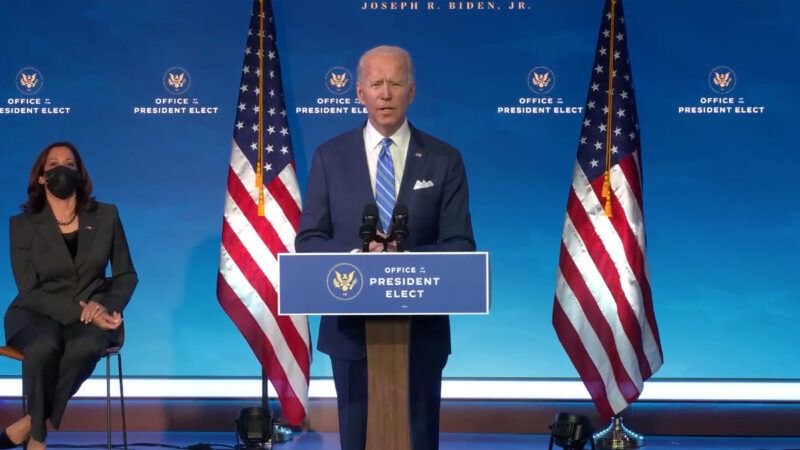Biden's $1.9 Trillion COVID Relief Package Includes More Stimulus Checks, State Government Bailout, $15 Federal Minimum Wage
On the brighter side, Biden wants 100 million vaccinations in 100 days and will push for immediate school reopenings.

President-elect Joe Biden called Thursday night for a $1.9 trillion COVID-19 package that will include another round of relief checks for most Americans, a bailout for state and local governments, boosted unemployment payments, and a higher federal minimum wage.
The package is the first part of what Biden called a two-step plan to get America through the rest of the pandemic. The second part will be the centerpiece of Biden's first State of the Union address, scheduled for next month.
Biden's proposals combine elements of last year's COVID-19 bills with some Democratic priorities that didn't make the cut. Biden will have slim Democratic majorities in both houses of Congress, but he stressed the need for bipartisan support on a spending package that he described as a response to a "crisis of deep human suffering."
"During this pandemic, millions of Americans, through no fault of their own, have lost the dignity of a job and a paycheck," Biden said. "It's tested us beyond measure."
About half the total cost of the proposal is aimed at households and unemployed workers. Biden wants Congress to approve $1,400 checks—on top of the $600 that individuals who earned less than $87,000 in 2019 received this month, as well as the $1,200 payments approved as part of the first COVID stimulus bill Congress passed in March 2020. It is unclear if there will be income cut-offs for the new payments, but Biden said he would push Congress to include adult dependents (such as college students) in the payments to households, even though they had been excluded from the $600 payments that Congress approved last month.
According to an analysis by the Committee for a Responsible Federal Budget, a nonprofit that advocates for balanced budgets, the new round of direct payments would cost $465 billion. Biden also called for Congress to expand the federal child tax credit from $2,000 per child to $3,000 per child, which would reduce federal revenue by about $120 billion per year.
Another major element of Biden's plan is a $400-per-month federal supplement to state unemployment payments, which will continue through September. That comes with a price tag of $350 billion.
Biden is also proposing $170 billion to assist in reopening schools and a $350 billion bailout of state and local governments. And on top of all that, Biden called for raising the national minimum wage to $15 an hour.
Those last two details may be the most contentious details. Democrats pushed for a similar bailout in earlier negotiations over COVID stimulus bills, but Senate Republicans blocked them. Democrats will have a slim Senate majority once the winners of two Georgia run-off elections are sworn-in, but the case for a state bailout remains shaky.
Democrats may still need Republican votes for much of Biden's plan. The reconciliation process could be used to amend existing tax and budget matters with a simple majority vote in the Senate—perhaps to do something like adjusting the amount of the child tax credit—but relief checks and a state government bailout will likely require 60 votes.
That may also explain why some other Democratic priorities, such as the restoration of the state and local tax deduction (the "SALT" deduction), are not included in the package Biden outlined Thursday. The abolition of the SALT deduction was a major element of the tax overhaul passed by Republicans in 2017, and undoing that would likely cost Biden any shot at GOP support for this proposal.
The big unanswered question is how Biden plans to pay for it all. Thanks to years of poor budgeting and overzealous spending by Congress and President Donald Trump, America faces a $3 trillion budget deficit and a national debt that's zooming towards $30 trillion. An additional $1.9 trillion will only add to the nation's already overburdened credit card.
Biden did not address plans for spending offsets or tax increases in his speech. An unnamed Biden official told The Wall Street Journal on Thursday that the president-elect did not believe now was the time for worrying about widening budget deficits and that Biden's focus was on the more immediate emergency.
Previously, Biden has indicated that he will push for higher taxes on corporations and on individuals making more than $400,000 annually.
In the coming days, Biden intends to outline his plans for a national vaccination effort, including an ambitious goal to deliver 100 million vaccinations during the new administration's first 100 days. To the extent that Biden can in fact streamline the process and get more shots in more arms, that's welcome. So too is a push to reopen the schools as soon as possible. And targeted relief for unemployed workers will help people harmed by the pandemic and by the government-imposed lockdowns it inspired.
But near-universal $1,400 checks are not good policy, no matter how popular they might be. States and local governments have the ability to make their own taxing and spending decisions and should not expect or require federal aid—and certainly not when the federal government is in such dire fiscal straits on its own. And ambitious plans to increase social spending and hike wages that don't have anything to do with the pandemic should be considered separately.
Congress should scrutinize each element of Biden's "part one" relief plan, and pass only the proposals that will directly and immediately help to end the pandemic or relieve its effects.


Show Comments (383)